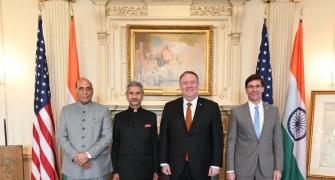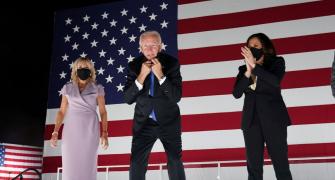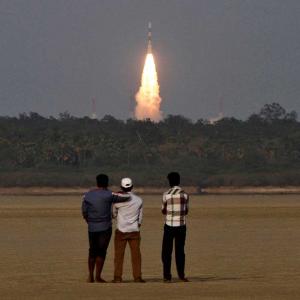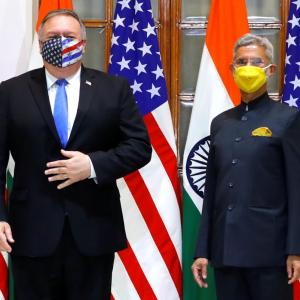With the situation in Ladakh tense and no resolution in sight, the trigger to take the India-US relationship to a transformational one is already there, observes Lieutenant General Syed Ata Hasnain (retd).

Despite being in the opposite camp with the former Soviet Union or remaining altruistically nonaligned India's relationship with the US was just cordial through the Cold War and never reached the threshold of closeness.
Post-Cold War there was a reluctant drag in spite of many changes in Indian foreign policy; yet the relationship could never really take off due to what may be termed adjustment issues.
Perhaps the geostrategic advantages to the US provided by Pakistan overshadowed the potential provided by India as an economic and defence partner; Cold War mindsets were not easy to overcome.
Some modicum of defence cooperation did begin through the Kickleighter proposals of 1991 but this was never ever near transformational in the making although Exercise Malabar between the US and Indian navies began as early as 1992.
The arrival of a personality like then US assistant secretary of state for South Asia in the first Clinton administration, Robin Raphel wasn't helpful either.
She unhesitatingly made it clear which side she was on with reference to the India-Pakistan equation.
The May 1998 Pokharan nuclear test, of course, put paid all efforts towards a stronger strategic relationship, at least for some time.
Indian perception in the nineties always harped on the US inability to ever appreciate India's plight at being one of the first countries to be hit by transnational terror.
Things started to change drastically with the presidency of George W Bush who besides looking at India through the prism of the rising threat of China also viewed it from the angle of the common terror threats.
The efforts towards the General Security of Military Information Agreement (GSOMIA) in 2002 had fructified but the technical agreements that were sought in the wake of it came under active negotiation only after Jul 2005 when the then defence minister Pranab Mukerjee visited Washington, SC during the early part of the second presidency of George W Bush.
As the India-US nuclear deal also got proposed around this time India's potential value as a strategic partner increased many notches.
Mercifully, the ongoing progression although slow did not lose steam even with change of political guard in both countries.
President Obama for much of his presidency tried to focus his attention on the then Asia Pacific region through his 'Pivot to Asia' or 'Rebalancing' strategy being fully aware of China's ambitions in the Pacific and Indian Ocean regions.
However, he was hamstrung due to US commitments in Iraq and Afghanistan and the rise of the ISIS in the last two years of his incumbency.
China continued to focus on the South China Sea islands at this time and India's strategic significance only enhanced.
With the COVID-19 pandemic the Indo Pacific is witnessing the threat of the two 'Cs', Covid and China.
China's apparent opportunistic approach has spurred the move towards greater collective security especially after the standoff in Ladakh with India.
India and the US signed the Logistics Exchange Memorandum of Agreement (LEMOA) in 2016 and the Communications Compatibility and Security Agreement (COMCASA) in 2018.
LEMOA came during Barack Obama's historic India visit in 2015 allowing the military of each country to make use of other's bases: refuel, access supplies, spare parts, air bases, and ports with reimbursed costs.
COMCASA was signed in September 2018, following the first 2+2 dialogue between the external affairs and defence ministers of both countries.
COMCASA allows the US to provide India with modern encrypted communications equipment and systems so that the US and Indian aircraft and ships can communicate through secure networks.
That deal enabled equipment which compulsorily comes with classified state of the art communications, to be purchased by India without a hitch.
It took the trust factor higher between the two countries.
Now comes the signing of long-awaited Basic Exchange and Cooperation Agreement (BECA), on October 27, 2020 at the third 2 + 2 Dialogue at New Delhi.
BECA is the crowning glory providing India with geo-spatial information which will allow India to access the US advanced geospatial intelligence and both countries can exchange topographic data including maps, nautical and aeronautical charts, commercial and other unclassified imagery, geophysical, geomagnetic and gravity data.
As per experts India's limitations in satellite imagery perceived during the June 2020 standoff in Ladakh will be largely overcome.
The slow progression of events which have taken 15 years to reach final culmination was expected as these are crucial agreements relating sometimes to classified information which the US is reluctant to part unless it has the fullest assurance.
The rising threat of China and the US perception of India as a suitable partner for its containment or balancing gave the emerging partnership some impetus, although India's insistence on its multilateral approach tended to pull back the emerging relationship.
What has actually taken aback most strategic commentators is the fact that President Trump decided to send the secretary of state and the defence secretary for the 2+2 Dialogue with India seven days before the crucial presidential election in the US which could see a change of administration.
A physical dialogue as against a virtual one further reflects the seriousness of the US.
Obviously these decisions come out of the seriousness attached to the situation in the Indo Pacific region where China has chosen to use the pandemic period to change course and coerce various countries with the purpose of creating for itself a position of advantage in the post pandemic world order.
India is one of those countries, others being Taiwan, Japan, Vietnam and Australia, all strategic partners or allies of the US.
The US is keen to display its commitment towards its strategic partners and contest China's ambitions even before the end of the pandemic.
With the situation in Ladakh tense and no resolution in sight the trigger to take the India-US relationship to a transformational one is already there.
In fact if there is one thing on which the Republicans and the Democrats would have convergence of policy at this juncture of the presidential race, it is on enhancing the depth and quality of the relationship with India.
BECA may complete a crucial progression of hi-tech agreements between Indian and the US, but most importantly the 2+2 Dialogue New Delhi 2020 could become a game changer in the security matrix of the Indo Pacific.
It will also give a boost to the Quad and help take it to a higher level of security engagement.
All four nations -- the US, Australia, Japan and India -- are slated to participate together in Exercise Malabar for the first time in the near future.
All this is appropriate messaging to China that nations it chose to coerce are not alone; they collectively oppose its hegemonic ambitions and are strengthening themselves to resist those.
Lieutenant General Syed Ata Hasnain (retd), PVSM, UYSM, AVSM, SM, VSM is one of India's most respected commentators on national security.
The general commanded the Indian Army's 15 Army Corps in Kashmir and was known as the 'People's General' in the Kashmir Valley
General Hasnain is a frequent contributor to Rediff.com.
Feature Presentation: Aslam Hunani/Rediff.com









